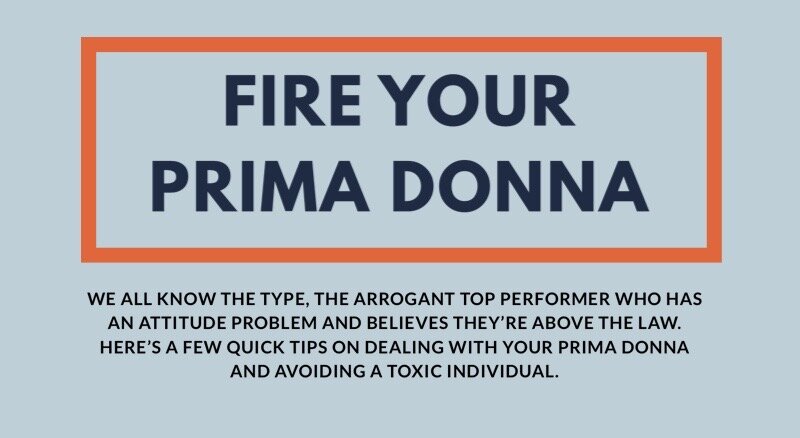Fire Your Prima Donna
Let’s take a look at the damage that a certain type of
Top Performer can cause to your team…
During the many years that I’ve been involved with sales environments, I’ve run across this issue quite a few times: “He’s disruptive to the overall functioning of the rest of the team, but I can’t fire him, he’s one of my top producers.” Or, “She’s one of our best, but she doesn’t follow the rules. Her attitude is affecting the morale of the other sales representatives.” My advice? Fire them both.
A Prima Donna is a high producing salesperson who is contributing in a negative way to culture, morale, and the overall performance of the team. These individuals are often described as “toxic,” and most of the time, their contribution to sales does not make up for the negative repercussions of their presence on the team.
Before you call HR and get the paperwork started, let’s make sure you’re providing an environment where high achievers can be contributors to team culture rather than toxic influences. In most situations, management has helped create this problem. Organizations that have a “sales at all costs” mentality are breeding grounds for poor behavior. Before you start eliminating your top performers, there are three things you should examine:
First, are you treating them special? You should! They are special. They are your high performers. What do you provide for them above the norm? What are they allowed to do that others are not? Are they allowed to set their own schedule? Do they have more authority, empowerment and decision making ability without having to come to you? In my experience, there are two big mistakes organizations make. Either they are not providing them with perks, or they are not formalizing and recognizing that these perks exist.
By formalizing and communicating the benefits and freedoms of being a top performer, you are recognizing and rewarding their achievement while giving the rest of the team something to strive for. You are also defining the limits of what your high performers are entitled to. If you provide perks and freedoms to your top performers without formalizing them, the rest of your team will perceive these as things they are getting away with, rather than something they are entitled to. This ambiguity will create jealousy and resentment rather than admiration and healthy competition.
Second, are you holding them accountable when they exhibit poor behavior? Once you have defined the benefits and communicated what they are entitled to, it is much easier to hold them accountable when they step outside these boundaries. Outside of sales performance, what are they also responsible for? They should be setting an example for your other team members with a positive attitude. If they are not, send them home for a day or two, or take their preferred parking space away from them. If you don’t hold them accountable when they exceed their limits, you are telling them there are no limits.
Third, are you feeding them? I’ve discovered quite a few times that the reason a particular person is performing is that the entire organization is feeding them leads: from the owner to the administrative staff. This happens either due to the perception of their ability or simply their longevity with the organization. Whenever someone at the company is asked, “who should I do business with?” the potential customer is handed off to the top performer because, “she’s our top representative,” or “he’s been here for twenty years.” Are they top performers because of their work ethic, experience, and talent, or because you are feeding them?
My advice is to communicate with the entire organization. Provide a spiff or a gift card for referrals from anyone in the company, but only if they give the referral directly to management. Now that management controls the flow of referrals, provide these leads to individuals who are talented team players who exhibit the behavior you want others to model. You might just find out that your prima donna is just an average producer who needs a wakeup call.
If you have this issue on your staff, perform a cultural reset by formally rolling out the three steps above. Chances are, these things alone will influence them to correct their behavior or weed them out over time. If it doesn’t, fire them. They aren’t worth it.
- Hans

